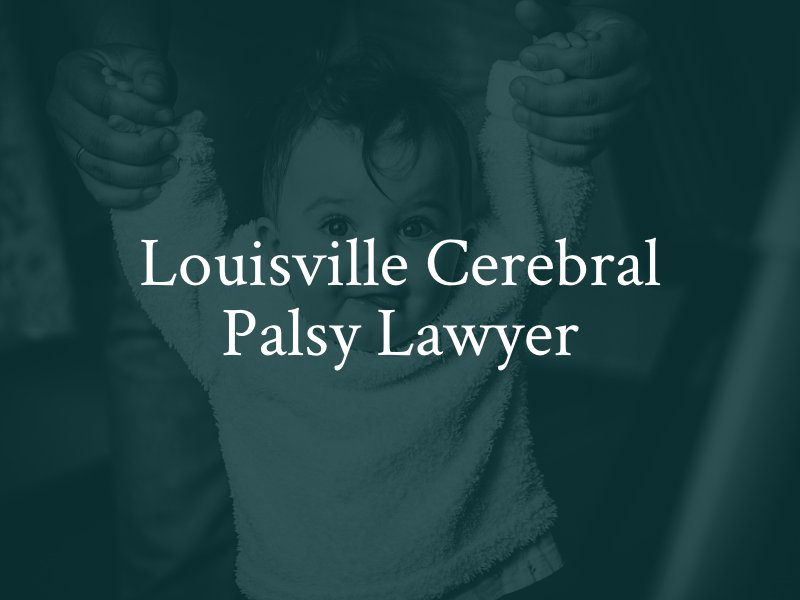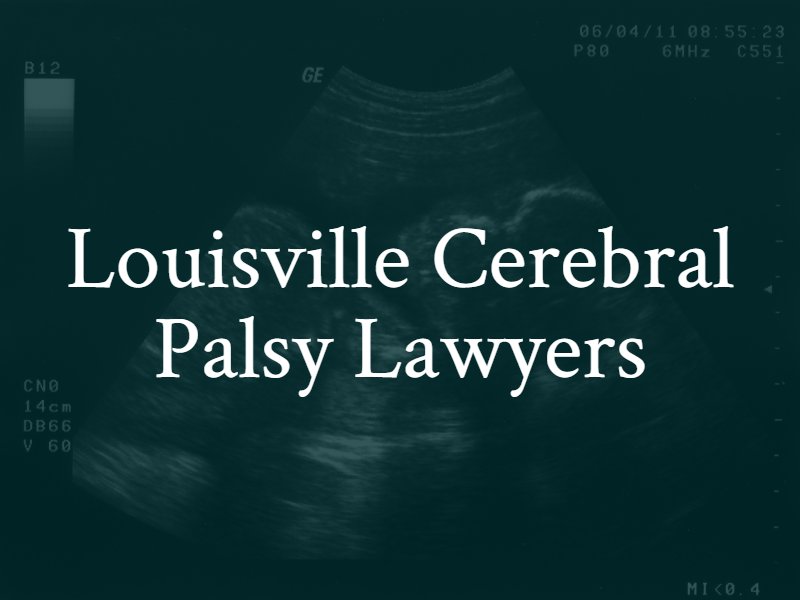Louisville Cerebral Palsy Lawyer
Cerebral palsy (CP) is a group of neurological disorders that can affect the motor function, muscle tone, and intellectual abilities of the individual. Cerebral palsy lasts for life, and diagnosis typically occurs at birth or in the months after. While certain things can increase the risk of having a baby with Cerebral palsy, doctors don’t always know what causes this condition. In some cases, medical malpractice is the reason children end up with cerebral palsy. If you believe this is the case with your child, contact the Louisville birth injury lawyers at Meinhart & Manning, PLLC. Your family could be eligible for compensation while also playing an integral role in preventing future birth injuries like Cerebral palsy in your hospital.

What Birth Injuries Can Cause Cerebral Palsy?
Cerebral palsy is the most common childhood disability. Cerebral means that a disorder relates to the brain. Cerebral palsy stems from issues with a child’s brain during pregnancy, delivery, or shortly after birth. If the area of the brain responsible for controlling movement suffers any kind of harm that prevents it from developing as it should, cerebral palsy can result. If someone is born with Cerebral palsy, the condition is “congenital.” If Cerebral palsy happens because of an injury after birth, it’s “acquired.” Different birth injuries that could cause CP in an infant include:
- Lack of oxygen to the brain during labor and delivery
- Lack of blood flow to important organs
- Bleeding in the brain
- Traumatic brain injuries
- Seizures at birth or shortly after
- Severe jaundice
- Maternal conditions, such as meningitis, rubella, herpes, syphilis, or chickenpox
- Prenatal exposure to drugs
Mistakes medical providers can make that result in a child’s Cerebral palsy include failing to monitor fetal vital signs, failing to detect umbilical cord problems, failing to order an emergency cesarean section, failing to diagnose and treat excess bilirubin, and misusing birth-assisting tools resulting in brain injury. If you suspect that someone was negligent in a way that caused or contributed to your child’s cerebral palsy, arm your family with a Louisville medical malpractice attorney who specializes in birth injuries. Legal representation can make all the difference in the outcome of your medical malpractice claim in Kentucky.
What Are the Different Types of Cerebral Palsy?
Cerebral palsy (CP) is not a single condition but rather a group of movement disorders caused by damage to the developing brain, typically occurring before, during, or shortly after birth. Each type of cerebral palsy affects movement in different ways, and understanding these types can help families better prepare for the future and explore effective treatment options. The four main types of cerebral palsy are:
- Spastic Cerebral Palsy. This is the most common type of cerebral palsy, affecting about 80% of people with CP. Spastic CP causes stiff, jerky movements and increased muscle tone, often leading to limited mobility. Children with spastic CP may have difficulty with fine motor skills, and their movements may appear awkward or rigid.
- Dyskinetic (or Athetoid) Cerebral Palsy. Dyskinetic CP is characterized by uncontrollable movements, including twisting or writhing motions. These involuntary movements can affect the hands, arms, feet, or face, making tasks like walking, eating, and speaking challenging.
- Ataxic Cerebral Palsy. Children with ataxic CP experience issues with balance and coordination. They may have difficulty walking steadily or controlling precise movements, such as picking up objects. Ataxic CP is the least common type, affecting only about 5% of people with cerebral palsy.
- Mixed Cerebral Palsy. Some children exhibit symptoms of more than one type of CP, which is referred to as mixed CP. For example, a child may have both spastic and dyskinetic symptoms. Mixed cerebral palsy presents a unique set of challenges, as it requires a tailored approach to treatment.
Risk Factors for Cerebral Palsy
While the exact cause of cerebral palsy is often unknown, certain risk factors may increase the likelihood of a child developing CP. Understanding these risk factors can provide insight into potential causes and help determine if medical intervention could have prevented the condition. Some of the most common risk factors include:
- Premature birth. Babies born before 37 weeks, particularly those born before 32 weeks, have a higher risk of developing CP. The earlier a baby is born, the greater the risk due to underdeveloped organs and potential complications.
- Low birth weight. Infants weighing less than 5.5 pounds at birth have an increased risk of CP, especially if they experience complications during delivery.
- Multiple births. Multiple births (twins, triplets, etc.) have a higher risk of cerebral palsy, often due to preterm birth or low birth weight. Additionally, if one twin dies in utero, it may increase the risk for the surviving sibling.
- Maternal infections during pregnancy. Certain infections, such as rubella, chickenpox, and cytomegalovirus, can increase the likelihood of CP if not properly managed during pregnancy. These infections can lead to inflammation around the baby’s brain, which can cause long-term damage.
- Complications during labor and delivery. Situations like prolonged labor, oxygen deprivation, or undetected umbilical cord issues can lead to brain injury and result in CP. Medical providers are responsible for carefully monitoring the mother and baby’s health during delivery to minimize these risks.
How Is Cerebral Palsy Diagnosed?
Diagnosing cerebral palsy is a process that may take several months or even years, as doctors need time to observe a child’s growth and development. Early signs of CP may appear within the first year of life, but a formal diagnosis may require extensive testing and specialist consultations. Here are some of the steps typically involved in diagnosing cerebral palsy:
- Developmental monitoring. During routine checkups, a pediatrician will assess a child’s motor skills, muscle tone, reflexes, and developmental milestones. If a child shows delays or unusual movement patterns, it may prompt further evaluation.
- Brain imaging tests. To better understand the cause of any developmental issues, doctors may recommend brain imaging tests, such as MRI or CT (computed tomography) scans. These tests can detect brain abnormalities that may contribute to CP, such as bleeding, cysts, or underdeveloped brain areas.
- EEG (electroencephalogram). If a child has experienced seizures, an EEG may be conducted to assess brain activity and determine if epilepsy or other neurological issues are present.
- Laboratory tests. In some cases, blood, urine, or genetic tests may be ordered to rule out other potential causes of a child’s symptoms, such as metabolic disorders or genetic abnormalities.
- Developmental and neurological assessments. Specialists in pediatric neurology, physical therapy, and occupational therapy may work together to evaluate a child’s movement, coordination, muscle tone, and cognitive abilities. These assessments help confirm a CP diagnosis and guide treatment recommendations.
Early diagnosis is crucial for managing cerebral palsy effectively and giving children the best chance to improve mobility and other functional skills. A confirmed CP diagnosis may also indicate the need for legal action if medical negligence contributed to the condition. A Louisville cerebral palsy attorney can help investigate potential causes and evaluate your legal options.

Hire an Experienced Louisville Cerebral Palsy Attorney
Cerebral palsy affects people in different ways and there’s currently no way to predict how much of an impact CP will have on a child’s life. Some people with cerebral palsy only have mild issues with muscle movement, while others cannot walk at all. Some notice changes with intellectual ability, while others do not. Cerebral palsy is a lifelong condition with no known cure. At Meinhart & Manning, PLLC our Louisville medical negligence lawyers believe the very least a family dealing with cerebral palsy deserves is just compensation for their damages. We work hard to achieve maximum recovery for our clients with cerebral palsy claims, making up for losses such as:
- A lifetime of medical costs and live-in care
- The child’s physical pain and emotional suffering
- Parents’ emotional and mental distress
- Lost quality/enjoyment of life
Our Louisville medical malpractice firm has secured six- and seven-figure settlements and verdicts for clients with permanent injuries or disabilities such as cerebral palsy. We extend our legal services to all counties in Kentucky. If doctors have diagnosed your child with cerebral palsy, receive a professional legal opinion on your case during a free case evaluation with one of our Louisville cerebral palsy lawyers. We’ll discuss your child’s condition and any potentially related birth injuries or complications, and file a medical malpractice claim on your behalf if applicable. We want to secure justice for your family. Call (502) 589-2700 to get in touch with our Louisville injury lawyers today.